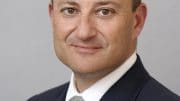Brian McArthur-Muscroft, Chief Financial Officer at leading global payments provider Paysafe, was named Inspirational Finance Director of the Year at the FDs’ Excellence Awards for 2017. Here, in an exclusive interview, he tells Director of Finance about the challenges currently facing the payments industry
First of all Brian, can you tell us a little about Paysafe? What are its main business objectives?
Paysafe was created when Optimal Payments and Skrill Group combined in 2015, and recently our shareholders voted to accept a $4.6 billion offer from private equity companies Blackstone and CVC Partners. Currently we are a public company listed in London, one of only three with a valuation above $1 billion.
Over the years, we’ve grown to become a leading global provider of payment solutions, with more than 2,600 employees across 12+ locations around the world. Our fundamental purpose is to enable businesses – whether that’s big retail enterprises or small merchants – and consumers to connect and transact with ease. We do this by always improving the products and services we offer, and having our finger on the pulse of new developments and trends within the payments industry. Our capabilities extend from payment processing and digital wallets to online cash solutions, and we aim to help merchants converge their bricks-and-mortar and online payments functions and deliver seamless consumer payment experiences.
We have been around for over 20 years, and last year alone we processed a combined transactional volume of $48 billion. Having operated in the payments sector since 1996, we’ve become adept at anticipating future customer needs in order to stay ahead of the curve. This is at the core of our culture and it has served us well in such a dynamic market sector.
How has the company evolved in recent years?
As you can imagine, the online commerce environment has changed significantly from representing just a small fraction of revenue for retailers and merchants in 1996, to becoming the channel of choice for millions of consumers globally. We can all name multiple, vast online superbrands that we now shop with on a regular basis. New industries have been created in the internet age and whole industries are now based on online-only subscription models. Take the travel industry, as an example, the average leisure and business traveller is dependent on their smartphone to search and book their travel and deal with disruptions or changes to plans once on their journey. All of this has opened up more doors for fintech players as the expectation from customers is that the payments side of this is secure and frictionless.

THE PAYSAFE POSSE: Brian McArthur- Muscroft, second right, with colleagues Max Lachance, Paysafe CEO Joel Leonoff, Jenny Lu, Ben Dalfen, Tim Thurman and Mike Giannoumis
And there’s no signs of this growth slowing as more and more industries invest in online and mobile technologies. This has presented fintech companies with enormous opportunities as technology has been a great leveller and has allowed us to cross borders and appeal to new sectors and industries. According to the analyst house Forrester, the e-commerce space is expected to be worth $424 billion by 2021. Payments are becoming a differentiator and the investor community is increasingly becoming more interested in the payments space. Businesses can no longer afford to treat payments as a mere commodity and must offer a range of payment types, in addition to the traditional methods, that fit the increasingly discerning consumers they serve.
You might say offering a diverse range of payments is now a competitive advantage. This has been reflected in our revenues and acquisitions. Our revenue has grown from $128 million in 2011 to $1 billion in 2016 against the backdrop of a booming e-commerce market. In July we announced the acquisition of Merchants’ Choice Payment Solutions (MCPS) for $470 million in an all-cash deal. This is another example of how we are strengthening our offering to become the preferred payment service provider in the e-commerce space.
You joined Paysafe in 2015. What have been the biggest challenges you have faced since you became CFO?
2015 was a significant year. We doubled the size of the business through the acquisition of Skrill, which was an exciting opportunity for us because to fund the deal, we successfully executed the largest ever rights issue on the London Stock Exchange AIM market and raised over $0.5 billion in debt. We also renamed the combined business to Paysafe, rapidly integrated the Skrill acquisition and we ended 2015 by moving our stock market listing to the Main Board of the London Stock Exchange.
We issued two 300+ page financial prospectuses in the year, one for the share issue and one for the move to main market. The latter involved careful due diligence of our business by the listing authority, in order to satisfy the UKLA that we adhered to the more stringent main market regulations.
In 2016, we joined the FTSE 250 Index of leading companies, and we achieved $1 billion of revenue for the first time and significantly increased EBITDA to $300 million. In 2016 we also completed two North American acquisitions, and then generated over $50 million of savings arising from the 2015 Skrill acquisition due to the integration being completed ahead of schedule.
Two and a half years ago our equivalent share price was £1.97. In June 2017, we received an offer three times this at 590p per share from Blackstone and CVC to acquire the entire business. In September, our shareholders voted to accept the offer and we anticipate the acquisition should close by the end of the year.
So, it is safe to say that things have been busy. Clearly these were all big opportunities for our company, and although it was challenging at times, we’re proud of what we’ve achieved so far.
Can you tell us a little about your career development before joining Paysafe?
Prior to joining Paysafe as CFO in January 2015, I was Group Finance Director at Telecity Group plc where I led the IPO of the business in 2007 and raised £400 million in senior debt facilities with major UK institutions. Before that, I served as Interim CFO of MCI Worldcom EMEA, the telecoms company (now Verizon), during the successful turnaround of the business. Since 2013, I’ve also served as non-executive director of Robert Walters plc and Audit Committee Chair.
What is your approach to business? What do you like about what you do?
At Paysafe we value transparency and openness. We worked hard to implement transparent financial reporting and that work has paid huge dividends, both in terms of the share price response and the quality of investors who became shareholders. Reputation is becoming more and more important, and today, our high level of transparency inspires confidence in the market and investor community.
We tell it like it is, and by doing that with all our financials, we’ve unpicked what’s really going on in the business.
At Paysafe, we’re also proud to appoint and nurture exceptional people. We have a talented and very experienced team in place who have been instrumental in helping us achieve our successes to date. We operate as a team and the success of our business reflects our collective hard work and commitment.
You have won several awards during your career. Can you tell us about them and which one, if any, stands out?
To me, those awards are actually more meaningful in recognising the collective achievements of finance teams I have been lucky enough to lead and the companies. The fact that team successes have been celebrated with honours from the likes of the ICAEW, CBI, Business Week and the FDs’ Excellence Awards makes me immensely proud.
More generally, how do you think the role of the CFO has changed over the years?
Although converging, there are remaining differences in the way CFOs across the Atlantic fulfil their role compared with those in the UK, however, one thing is for certain – CFOs cannot rely solely on their ability to produce accurate financial statements and run the finance function. That is now a given – the minimum expected output.
The role has evolved to become much more commercial and forward-looking. Today’s CFOs must be able to articulate the company strategy, work with a multitude of internal stakeholders, while running the business efficiently using appropriate internal KPIs. Today, CFOs are expected to be true partners to the CEO, and to be able to present the business to the potential investor base while managing the raising of equity or debt capital. The CFO has to be seen as credible and trustworthy by stakeholders in the business and an articulate spokesperson. Internally, it’s equally important for CFOs to ensure they are communicating well across the entire organisation to equip employees with the knowledge they need on their employer’s financial performance.
There has been a recent quarter-point rise in interest rates to 0.5%. What effect is that going to have?
Like other large UK-listed companies, most of our revenues are derived from outside of the UK, so we have to look at the broader US and European economies as well as our own. As a private equity owned business we will have more debt capital than as a public company, so interest rates will be something we keep an eye on in the US and Europe.
What advice would you give the younger generation if they were thinking about working in the financial sector?
It’s a very competitive market. Almost every CV I receive presents prospective candidates that are technically very strong, but technical skills are now a basic requirement. My advice to candidates is to make yourself stand out as an individual but be true to yourself. All businesses rely on people at their core. Commercial acumen, presentation, problem-solving and negotiation skills are as important as technical ability.
If you had to sum up your approach to business in three words, what would they be?
Sustainable profitable growth.






Be the first to comment on "The Big Interview: Paysafe’s Brian McArthur-Muscroft"